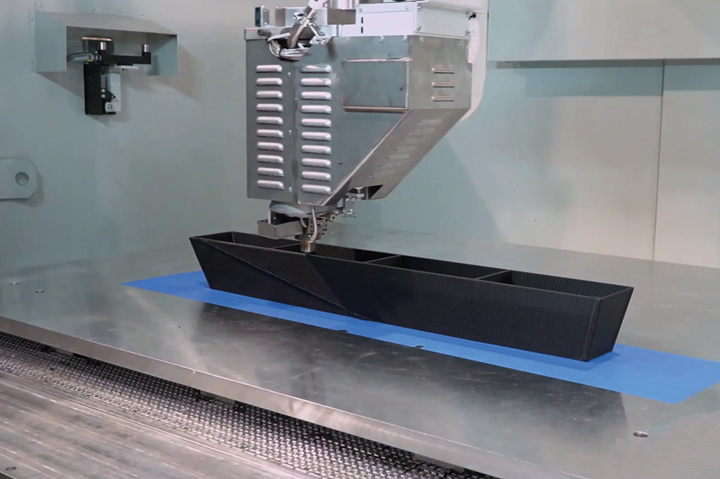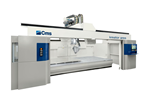Swissplast Group to produce large-scale 3D-printed components via hybrid LFAM machine
Developed between CMS Advanced Materials Technology and the Fraunhofer Institute, the additive technology produces thermoplastic granulates reinforced with carbon or glass fiber.

Photo Credit: CMS SpA
CMS Advanced Materials Technology, a division of CMS SpA (Zogno, Italy and Caledonia, Mich., U.S.) and part of the SCM Group (Rimini, Italy), has worked with the Fraunhofer Institute (Munich, Germany) to develop a hybrid large-format additive manufacturing (LFAM) machine, an integration of a tool machine and large-scale 3D printer.
The LFAM technology adopts what is known as screw extrusion additive manufacturing (SEAM), a 3D print extrusion unit developed by Fraunhofer IWU (Chemnitz, Germany) for the production of large components. The screw extruder is capable of producing standard thermoplastic polymer granulates reinforced with carbon or glass fiber. Materials that have been tested include PA, PP, PESU, PEI, PET, ABS and Airtech’s (Huntington Beach, Calif., U.S.) Dahltram resins.
According to CMS, the first hybrid machine will be delivered to plastic parts fabricator Swissplast Group (Sargans, Switzerland) in April 2022, enabling the company to produce large-scale 3D pieces with maximum sizes of 1,800 x 2,200 x 800 millimeters under the future brand, swiss3Dprint.
“Innovation is our top priority,” says Barac S. Bieri, owner of Swissplast Group. “For years we have carefully followed everything happening on the market. With the hybrid machine, that can print large volume pieces up to 1,800 x 2,200 x 800 millimeters, we have finally achieved the long-awaited innovation.”
Related Content
-
Composites manufacturing for general aviation aircraft
General aviation, certified and experimental, has increasingly embraced composites over the decades, a path further driven by leveraged innovation in materials and processes and the evolving AAM market.
-
Running shoe insoles get a lift with thermoplastic fiberglass tapes
FlexSpring insoles take advantage of unidirectional, continuous fiberglass and thermoplastics to enable next-level performance for the everyday runner.
-
Bioabsorbable and degradable glass fibers, compostable composite parts
ABM Composite offers sustainable options and up to a 60% reduction in carbon footprint for glass fiber-reinforced composites.













